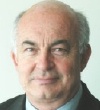 In this morning’s Washington Post, Richard Holbrooke summarizes the past few month’s events in the virtually unfollowed UNSG campaigns.
In this morning’s Washington Post, Richard Holbrooke summarizes the past few month’s events in the virtually unfollowed UNSG campaigns.
Almost invisible to the general public, a major international election campaign is underway. It is the equivalent of primary time now, and candidates are flying quietly into New York, Washington, Beijing, Paris, Moscow and London, meeting with foreign ministers and other officials with little or no fanfare, and slipping out of town again, often denying they are running for anything at all. Although most Americans have not yet heard of any of the candidates, the winner will instantly become a major world figure.
The job they are running for is, of course, secretary general of the United Nations…
Holbrooke provides the necessary emphasis on the challenge arising to Asia’s turn in the regional rotation from Eastern Europe, and expertly underscores it in terms of Chinese foreign policy.
I seriously doubt that the Asians, having allowed Africa to hold the position for 15 straight years (Boutros-Ghali and two terms for Kofi Annan), and not having had an Asian secretary general for almost 40 years (since U Thant of Burma in the 1960s), will allow the brass ring to pass them by again. Especially for China, the next S-G — who would be the first Asian in the post since Beijing took over the Chinese seat in 1972 — offers a major opportunity that coincides with their newly assertive diplomacy throughout the world. And remember: No one who is not acceptable to both Beijing and Washington can get this job…
 Holbrooke reminds us of dark horse candidate Kemal Dervis (from Turkey), head of the UNDP since August, in the context of the Asia’s geographic reach. Well respected by all, his candidacy may provide an out to those who have committed to an Asian candidate (Turkey is technically in Asia) as well as the East Europeans (of which Turkey desparately wants to be the newest member). Of course, Mr. Dervis’s spokesman is making it known that his boss is not a candidate for the post.
Holbrooke reminds us of dark horse candidate Kemal Dervis (from Turkey), head of the UNDP since August, in the context of the Asia’s geographic reach. Well respected by all, his candidacy may provide an out to those who have committed to an Asian candidate (Turkey is technically in Asia) as well as the East Europeans (of which Turkey desparately wants to be the newest member). Of course, Mr. Dervis’s spokesman is making it known that his boss is not a candidate for the post.
Joining the no-longer-whispering crowds, Holbrooke also suggests that the selection of Annan’s succesor will take place much earlier than in previous turnovers, perhaps conveniently at the start of the UN General Assembly 61st session in September.
Though profiling the broadly known “front-runners,” Holbrooke reminds readers not to assume one of these will be The One. As mentioned elsewhere, he suggests that either Goh Chok Tong, the former prime minister of Singapore, or Prince Zeid Raed Hussein — “the deft and elegant young Jordanian ambassador to the UN” — may emerge as the compromise candidate. (Both Asian by the way!)







